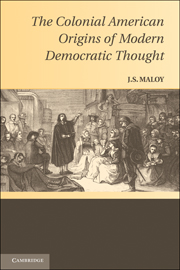Book contents
- Frontmatter
- Contents
- Preface
- 1 Introduction: Accountability and Democratic Theory
- 2 Radical Trust and Accountability in the Seventeenth Century
- 3 Fidelity and Accountability in Virginia and Bermuda
- 4 Politics and Ecclesiastics in Plymouth and Massachusetts
- 5 Constitutional Conflict and Political Argument at Boston
- 6 Democratic Constitutionalism in Connecticut and Rhode Island
- 7 Conclusion: Anglophone Radicalism and Popular Control
- Bibliography
- Index
4 - Politics and Ecclesiastics in Plymouth and Massachusetts
Published online by Cambridge University Press: 03 December 2009
- Frontmatter
- Contents
- Preface
- 1 Introduction: Accountability and Democratic Theory
- 2 Radical Trust and Accountability in the Seventeenth Century
- 3 Fidelity and Accountability in Virginia and Bermuda
- 4 Politics and Ecclesiastics in Plymouth and Massachusetts
- 5 Constitutional Conflict and Political Argument at Boston
- 6 Democratic Constitutionalism in Connecticut and Rhode Island
- 7 Conclusion: Anglophone Radicalism and Popular Control
- Bibliography
- Index
Summary
It seems most agreeable with the light of nature that, if there be any regular government settled in the church of God, it must needs be a democracy.
John Wise, 1717 (Wise 1958, 60)In the 1590s the separatist martyr-to-be Henry Barrow developed his ideas on church government by dint of an attack on the “constitution” of the Church of England, thereby supplying one of the first known instances in which that word was used to refer not just generically to laws or ordinances but more specifically to a systemic configuration of authority (Stourzh 1988, 39). In the next couple of decades Henry Ainsworth, another English Calvinist known for his separatism, would use the term “constitution” in a similar fashion as he developed his own ecclesiology (40). The colonists who founded New Plymouth in 1620 owned and read books by Barrow and had known and worshiped with Ainsworth in their years of Dutch exile. It is therefore a fact of some interest for the origins of democratic constitutionalism that the so-called Pilgrims and their pastor, John Robinson, subscribed to a radically populist theory of church government, in defense of which they had backed Ainsworth in an important intramural dispute in the English exile church at Amsterdam.
One reason for the relative lack of scholarly interest in the political ideas of the early New England colonies may be a failure to appreciate that, in the minds of seventeenth-century puritans, theories of ecclesiastics were theories of politics. New Englanders recognized important differences between spiritual and temporal forms of power, but they also acknowledged the essential unity of their organizational principles.
- Type
- Chapter
- Information
- The Colonial American Origins of Modern Democratic Thought , pp. 86 - 113Publisher: Cambridge University PressPrint publication year: 2008



